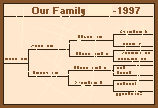Page 2
Doing Their Homework At times, beginning genealogists start their research, by trying to find out their great-great grandparents identity, or who was the first one to immigrate to America. This often becomes very frustrating for them because they usually can not find any information or sometimes they find things that they think are true, then they find out later that their information doesn't apply to their family history.
It is very important to understand that there are several key sources of information to be found before you use the Internet.
1. You need to have a good base before you ever start your online research. Using the right forms and putting down as much information as you know. 2. You need an online research plan of information you already know in place to make your online searching much more profitable.
You can use these resources to build a good base before you start your surfing on the internet. You can however use the online resources to help you find out what type of information you will need to get started. |
 |
Always start with yourself |
|
Make sure you know everything about yourself first before you ever go online, to libraries, or any other source to do your research. Take a pad of paper, pencils, tape recorder ( ask permission first) and do an interview with family or friends. Start by asking the following people: parents, grandparents, great grandparents, aunts, uncles and close friends many questions.
You need to try to find out your ancestor's entire-name first, middle and last, birth dates and their siblings' names, where they were born, ( country, city, township and county). If you can find out their siblings name that is also beneficial. Knowing the siblings' names will help you know whether you have found the right family when you are doing your research.
These are the very first steps to a successful journey before you ever start your genealogical research at libraries, courthouse or online.
Doing your homework first each time you go and work on your genealogy is the key to being a successful genealogist. |
| Genealogical Lingo |
|
|
Genealogy Dictionary - Dott's Genealogy Page |
||
|
|
Genealogy Terms - Charlotte's Web Genealogy and Family History |
|
|
Glossary of Genealogical Terms and Abbreviations - Understanding exactly what is stated in any record is vital before attempting to move to the next generation. Inexperienced or impatient genealogists undervalue the quality of their research by applying present-day definitions to documents created in an earlier century. Take the time to use the glossary provided here and other excellent dictionaries, genealogical reference books and encyclopedias to interpret documents correctly. |
 |
Looking for records
Start first my asking your parents, grandparents, aunts, and uncles or close personal friends if they know or have any of the following information baptismal, births, deeds, death, diaries, divorce, family bibles, family letters, insurance policies, marriage, membership cards, military records, mortgages records, naturalization records, newspaper articles, obituaries, titles, wills. Use these records to find your family at Libraries, Courthouses or on the Internet. The Internet may be the last place to look rather then the first place you look. |
|
|
Ancestry First Steps - How to get started with your family history research. Discovering your Heritage. |
|
|
Step by Step Guide - How-To" Guide contains addresses and experienced researchers that will find useful. It also has step-by-step instructions for locating different types of family information and printable census, correspondence and other forms to speed up your research. |
 |
Land Records Local land records may tell you many things so this makes them a very valuable tool. |
|
|
Analyzing Deeds for Useful Clues - How does one properly analyze a deed? Sure, we know to copy all the relevant data; but how do we harvest nuances, implications, and indirect connections that move beyond the realm of fact to the more-nebulous world of clues worth pursuing? | ||
|
|
Antique Town Maps in New England - Reproductions of Old Town Maps with Family Names. A resource for Genealogy, History, Research & Education | ||
|
|
Cyndi's list land records - Land Records, Deeds, Homesteads, etc. | ||
|
|
Generations Press Town plans and Maps - variety of genealogical books and research tools in the areas of Jewish genealogy, Southern California resources, immigration research, and map reproductions | ||
|
|
Great Land Sale - Michigan Great land sale. About 5,000,000 acres of state land were offered at public sale at Lansing, Mich., commencing on the 28th day of July, 1858, and the sale continued from day to day, until all are were offered. | ||
|
|
History & Use of Land Records - By Linda Haas Land was the symbol of power, wealth and social status in the Old Word and immigrants flocked to the new world to acquire the one commodity the New World had to offer in rich abundance - land. | ||
|
|
How to Search Deeds - From DoHistory. Deeds are records of land ownership and transactions. They can date back to before the American Revolution. They reveal much more than ownership, however. They may also give information about relative land values, about who could hold land, and about relationships between people. | ||
|
|
PCL Map Collection - Online Maps of Special Interest | ||
|
|
Terminology of Deeds & Land Transactions - Land Record Reference sponsored by Direct Line Software, makers of DeedMapper mapping products for the PC. | ||
|
|
TIGER Maps of U.S. Areas - The term TIGER® comes from the acronym Topologically Integrated Geographic Encoding and Referencing which is the name for the system and digital database developed at the Census Bureau to support its mapping needs for the Decennial Census and other Bureau programs. | ||
|
|
U.S. Land and Property Research - This is a self-paced set of lessons on the basics of land and property research in the United States. | ||
|
|
U.S. Surname Distribution - Enter a surname (last name) into the form and you'll get a map of the United States showing the distribution of people with this surname within the 50 United States. This map is often helpful when trying to determine a starting point for genealogy projects. |
|
|
The Soundex system is based on the sound of a name rather than the exact spelling. You need to learn your soundex numbers before you try to look up some of the later census records. Learn how to do your soundex so you can use the census records from 1880 - 1920 that use soundex more effectively. I need to tell you that the Soundex is subject to human mistakes. The indexes were done by humans so you may find some mistakes, some coding may be wrong. If you are unable to find your ancestor and you know they should be there you will have to go line by line. There are many countries besides the US that use soundex. |
 |
Surname Information If you can, start with a more unique name the first time you go online. You want to be able to find your surname without going through page after page of information. You want to be able to have a better chance of finding something your first time surfing the net. |
 |
Do not overload yourself Do not try to do all your families all at the same time. Go slowly and start with the surnames you have the most information on. If you go too fast you run into getting too frustrated and confused and your online experience will not be successful.
|
|
|
